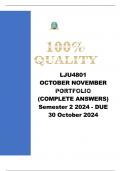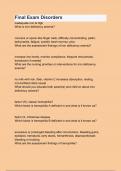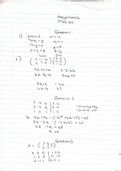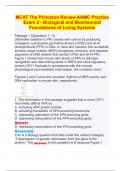Exam (elaborations)
LJU4801 OCTOBER NOVEMBER PORTFOLIO (COMPLETE ANSWERS) Semester 2 2024 - DUE 30 October 2024 - Course Legal Philosophy (LJU4801)
- Course
- Legal Philosophy (LJU4801)
- Institution
- University Of South Africa
Question 1 Read the following scenario and then answer the question below: The football governing body is investigating Mark Pachio’s deliberate handball during the quarter final match between Shibobo FC and Maluti FC. Shibobo FC defender, Pachio, used his hand to stop Mpho Motale’s header on t...
[Show more]







